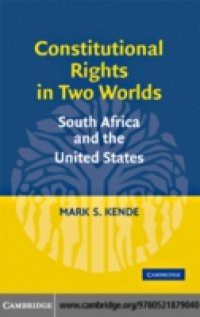The South African Constitutional Court has issued internationally prominent decisions abolishing the death penalty, enforcing socio-economic rights, allowing gay marriage and promoting equality. These decisions are striking given the country's apartheid past and the absence of a grand human rights tradition. By contrast, the US Supreme Court has generally ruled more conservatively on similar questions. This book examines the Constitutional Court in detail to determine how it has functioned during South Africa's transition and compares its rulings to those of the US Supreme Court on similar rights issues. The book also analyzes the scholarly debate about the Constitutional Court taking place in South Africa. It furthermore addresses the arguments of those international scholars who have suggested that constitutional courts do not generally bring about social change. In the end, the book highlights a transformative pragmatic method of constitutional interpretation - a method the US Supreme Court could employ.

